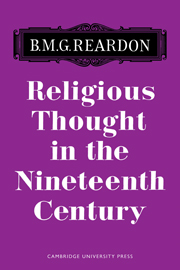Summary
The fundamental weakness of Hegel's interpretation of Christianity lay in its failure to appreciate the significance of the historical personality of Jesus Christ himself. Hegelian theology is an abstract system for which history provides much less the indispensable ground than a series of apposite illustrations. Hegel's disciple, David Friedrich Strauss, realized this and whilst hardly more than a youth set himself the task of rendering a strictly historical account of Jesus in which—the author's presuppositions being what they were—no miraculous element would be allowed to remain. Hitherto a ‘life’ of Christ had always required a dogmatic framework and had been presented with an apologetic interest. The historicity of the gospel narratives, even in their details, had been assumed instead of investigated. Further, although orthodox writers, as was to be expected, took the supernatural for granted, the professed rationalists themselves, in rejecting the supernatural, did no more than offer alternative and naturalistic explanations of the same alleged phenomena. This procedure had often been carried (as, for example, by Paulus) to absurd lengths, making the rationalized story not only no more credible than the original but misrepresenting the truth underlying it. What, in Strauss' view, must be understood is that the gospel records sometimes testify, ‘not to outward facts, but to ideas, often most poetical and beautiful ideas… reflexions and imaginings such as were natural to the time and at the author's level of culture’. The issue therefore is not a simple distinction between fact and fiction, actual divine interposition and deliberate fraud.
- Type
- Chapter
- Information
- Religious Thought in the Nineteenth Century , pp. 113 - 124Publisher: Cambridge University PressPrint publication year: 1966

